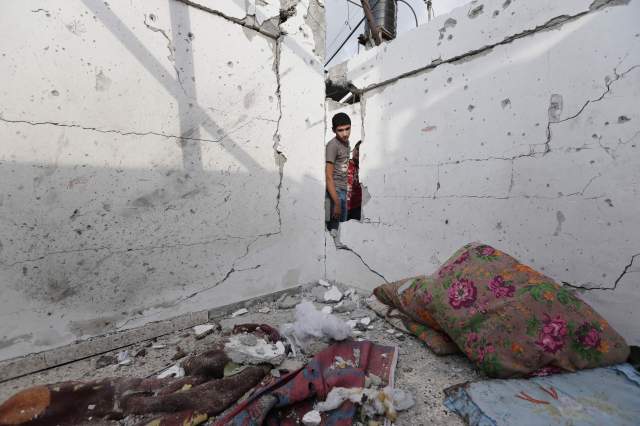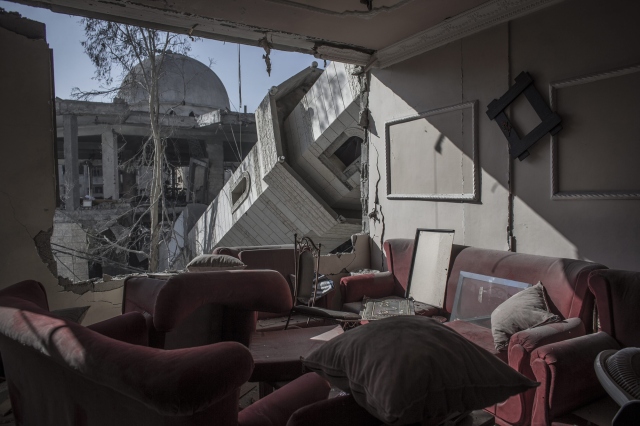Toby Cadman joins JiC for this guest-post on why there is seemingly a reluctance on the part of the Palestinian Authority to sign the Rome Statute of the International Criminal Court (ICC). Toby is a barrister from 9 Bedford Row. He is defence counsel at the Bangladesh Tribunal and has been counsel in the Uhuru Kenyatta case at the ICC.
There are many matters to resolve in Israel and Palestine and this may appear overwhelming to the extent of not truly knowing where to start. But the first theme that we can address is justice and accountability. It is only through the establishment of a system based on the rule of law that there can be an even playing field as a precondition to peace and reconciliation. Everything else must follow as a natural consequence of this first, most important step.
However, one cannot, and should not, waive the rule of law in front of a menacing foe as a stick and carrot. One should not choose a political solution at the expense of justice. It has been said before but change, real change, comes from a position of strength, not of weakness. The Palestinian Authority must recognise that its position of strength is ratifying the Rome Statute of the ICC and bringing the perpetrators to justice – not threatening its ratification for a greater political solution, however noble that cause may be.
Against that background, on 30 October 2014, I was invited by the Tunisian Presidency to attend a high level conference hosted by the Centre for Strategic Studies for North Africa to discuss Palestine in the broader political sense. I gave a presentation on the complex jurisdiction of the ICC and alternative mechanisms for ensuring accountability. I spoke about the role that international law can play in supporting the victims of occupation and the siege of Gaza. It was made quite clear that there remains significant appetite to see justice done, be it by cases being dealt with before a national or international court of criminal jurisdiction, or through other judicial means, namely consideration to be given to the pursuit of those foreign nationals serving in the IDF who may be responsible for some of the very clear instances of war crimes.
The conference, although covering an array of political considerations, was dominated by the issue of an ICC investigation, following the opening speeches from a host of Palestinian groups, including members of the Palestinian Authority and human rights activists. The conference also saw a number of international dignitaries including members of the UK Parliament and House of Lords.
I repeatedly made the point during my presentation and follow up discussions that we must not shy away from confronting Israel on these important issues – particularly the very serious allegation that its conduct, taken as a whole, may constitute a crime against humanity.
Having heard the speeches and discussions in Tunis, it is clear that the preferred route to justice and accountability would be to pursue matters before the ICC. However, President Mahmoud Abbas and the Palestinian Authority are delaying the ratification of the Rome Statute, instead using the ever-present threat as leverage for an Israeli withdrawal from the West Bank and the drawing up of borders. This is, in my respectful opinion, a dangerous course of action.

A young Palestinian examines damages to house in the Jebaliya refugee camp that had been hit by an Israeli strike. (The Associated Press)
The position of Fatah therefore would appear to be one of willingness to sign, but only as a last resort, should all other routes of negotiation to achieve the stated objectives fail. Hamas, on the other hand, has adopted an entirely different position. It has urged the Palestinian Authority to ratify the Rome Statute, despite there being a significant risk that its own members may also face investigation over the firing of rockets into Israel and the allegation that it has used civilian installations to store weapons. Hamas has confirmed in writing to Fatah, that the Rome Statute should be signed without delay and that it would welcome its adoption. The delay therefore is on the part of Fatah rather than Hamas. Such delay has in itself been criticised, however there may arguably be a method to the madness.
On 1 October 2014 the Palestinian President stated that his Government would join the ICC in The Hague in the event that the proposed UN Security Council Resolution on drawing pre-1967 borders and an Israeli withdrawal from the West Bank failed. The plan being proposed by the Palestinian Authority would see an end to occupation in two-to -three years. Abbas stated that if the United States vetoes the plan, as must surely be expected, the immediate ratification of the Rome Statute would follow. If one is to consider the recent statements made by members of the US Administration in relation to the situation in Gaza and the need for a two State negotiated solution, the underlying message is quite clear.
On the one hand, criticism of the ICC being used as a political issue is justified, in that justice should not be used as a political bargaining tool. However, one must also consider what President Abbas is seeking to achieve and whether this is for the greater good – whether there is method to the madness. While it cannot be denied that there are actions that would justify an ICC investigation, it is also clear that the apparent peace process has not made any meaningful steps for some time. The issue of a two state solution appears to be all but dead, and the question of the annexation of Jerusalem is not being discussed given Israel’s refusal to engage.
Clearly something must be done. And if this forces the hand of the international community then so be it. However, we must also be realistic as well as hopeful. Hopeful that the international community will actually take positive steps to reconcile the issue, but realistic in that the US is very likely to veto any such attempt for such a resolution and recognise that Israel will simply put its head in the sand and hope this all goes away.
Despite the very likely use of the veto card by the US, recent events demonstrate that international attitudes towards Israel are changing. Israel has recently confirmed a plan to build further settlements in East Jerusalem, settlements that have no legal basis under international law. This is off the back of further land grabs in Bethlehem and Hebron. However, these settlements are often ignored aside from the expected rhetoric from certain countries, although it would appear that the US has finally started to take the issue seriously, with President Obama openly criticising the decision to approve the plan. Does this mean that Israel’s most significant supporter and the country that effectively allows Israel to act with impunity is changing its position? It is unlikely that we will see an immediate and fundamental departure from its support for Israel, but it is a telling change in the political landscape that such comments are being made. It is also clear that those States seeking to bring about change in the pursuit of Palestinian Statehood will have to confront the US and its unwavering support for Israel.
Taking into account all of the above, we must consider why membership of the ICC is still being used effectively as a political tool when President Abbas must know that the proposal will be rejected. Many are suggesting that this is the last throw of the dice. Israel clearly has no intention of returning to pre-1967 lines, and has no intention of truly supporting and seeking to make progress with the two state solution. But it is perhaps here that there may be method in the madness. The Palestinian proposal is aimed at bringing an end to the violence. It is aimed at a negotiated settlement. The question therefore is whether the waving of the ICC carrot in front of the permanent members of the UN Security Council is a show of weakness or a demonstration of strength.

A collapsed minaret rests against the exterior of an apartment block in Gaza City (Photo: Oliver Weiken / EPA
The US has criticised Palestine for seeking to ratify a host of international treaties and seeking ICC membership, arguing that to do so interferes with the peace process. Such a statement is troubling on so many levels, but putting to one side the obvious hypocrisy in such an approach, the response by the Palestinian Authority may be all the more justifiable. The Security Council draft resolution appears to be aimed at a peaceful, and equitable, solution, an end to the occupation, the drawing up of pre-1967 negotiated borders and a structured withdrawal of Israeli troops from the West Bank. Effectively, this is the Palestinian Authority giving the international community a final opportunity to make good on their promises. Failure to do so will result in what Israel, for all its bluster, is truly scared of, an end to impunity and holding accountable those persons responsible for the 2,100 civilian deaths during Operation Protective Edge. This is, in this author’s opinion, a dangerous course of action considering that the likelihood of Israel engaging in such a process is minimal at best. Therefore, the question is what is likely to compel Israel to engage.
For all its rhetoric, Israel knows that it cannot justify the killing of so many civilians, including a disproportionate number of children. It knows that the argument of self-defence can only carry so far, and it does not cover the firing on civilians on a beach, or the use of white phosphorus or flechettes. Israel knows that an investigation will force it, and some of its international partners, to face a very uncomfortable reality.
The people of Palestine cannot be silenced, nor can they be kept as second class citizens, subjected to Israeli military rule, permanently reliant on aid given the blockade of Gaza, and unable to express themselves and grow as a sovereign nation. Palestine must be afforded the same rights as all other states, respect for its people, respect for its borders, and perhaps above all, sovereignty.
The constant incursions into the West Bank and into Gaza must stop. The illegal settlement building must stop. The blockade must stop. It is hoped that the shared agenda that came out of the Tunisian conference can assist in some way in achieving these aims given that it showed unity amongst Palestinian factions/parties and, significantly, members of the international community.
Those that have been calling for ICC membership may well get their wish, as Abbas must follow through. He cannot allow the issue to be used as an impotent political tool forever, more so now that there is further pressure being exerted given the position of Hamas.
The position of the Security Council is no longer so black and white. Israel is concerned that the US might not throw its get out of jail free card on to the Security Council table on this occasion. The ‘Palestinian Peace Initiative’ cannot be dismissed out of hand. It is a rational and workable plan with a timeline. It is not posturing. Israel constantly accuses Palestine for failing to address the real issues and constantly deflecting responsibility. Well here is the response. However, this plan should not replace accountability, it should supplement it.
There must come a point at which the international community takes a stand against Israel for its own failings. Yes there must be accountability and there must be justice. But there must also be an environment of stability. If Israel refuses to work with Palestine to resolve the issue, and if Israel continues to act with such impunity, it will be effectively thrown into the diplomatic wilderness. The only recourse may then be with the ICC.



Pingback: Under Attack: The Syrian first lady supports the fight against Al Qaeda and ISIS | SHOAH
Pingback: Under Attack: The Syrian first lady supports the fight against Al Qaeda and ISIS – Veterans Today | Military Foreign Affairs Policy Journal for Clandestine Services